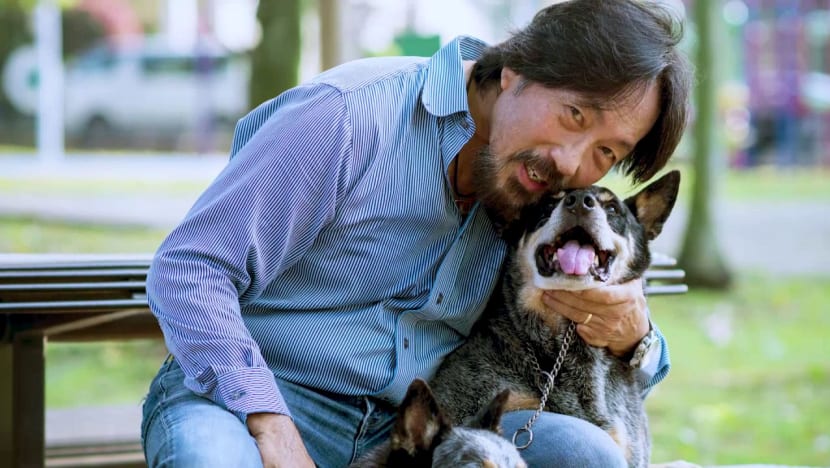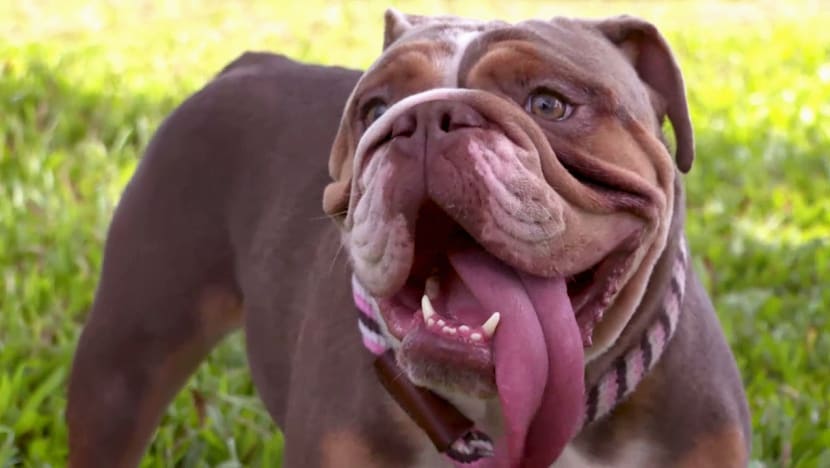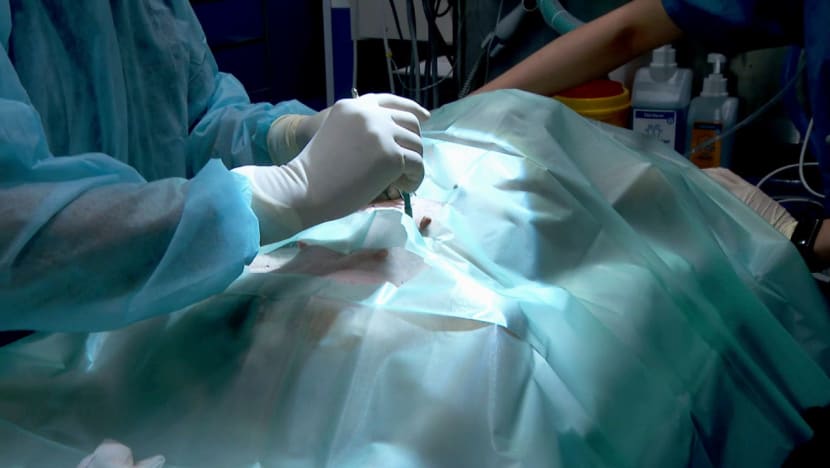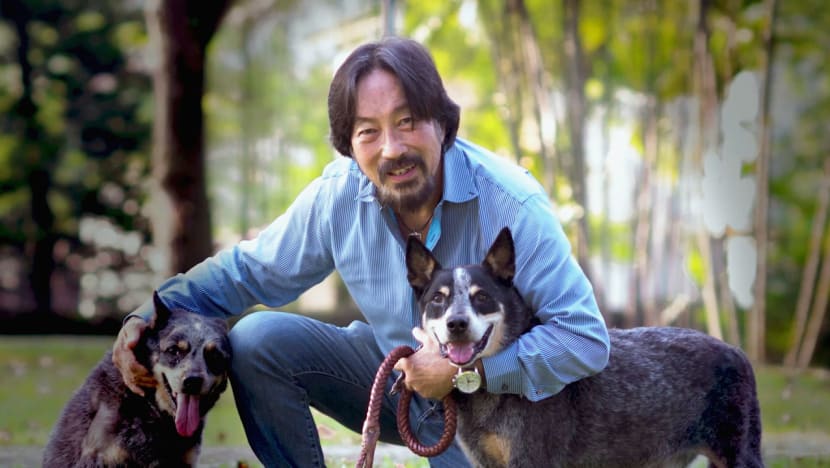Would you clone your dog or cat? Some Singapore pet owners have taken the first step
Pet cloning sounds novel but has been around for over a decade. People in favour of the practice say some pets are ‘one in a million’, but opponents cite animal welfare and other issues.

Dr Jean-Paul Ly's dog, Khan, was fearless, intelligent and a big source of comfort. Photo courtesy of Jean-Paul Ly
SINGAPORE: Travelling between Sydney and Gold Coast in Australia years ago, vet Jean-Paul Ly and his children stopped at a restaurant for a meal. A farmer walked in with two cattle dog puppies.
Ly’s children cuddled the dogs and asked their father if they could have them. The family could take only one, and Ly chose the blue cattle dog.
Eight-week-old Khan quickly showed it was fearless and intelligent. On the third day at its new home in Gold Coast, it went missing. The children walked along the nearby river, calling its name. When they returned home, they found it standing by the door, Ly recounted.
Khan was also a source of comfort when Ly was at his lowest. “He’d sit there and look at you. And when he’d look at you, it was like he understood,” said Ly. “When I was sad, he’d come up and nuzzle up against me.
“When he died, a piece of me died with him.”
Seven to eight months before Khan died at the age of 17, Ly took the dog’s skin cells and had the sample frozen.
After its death in August, he decided to try cloning Khan at an overseas facility: Sinogene, a Chinese company that made the headlines in 2019 when it produced China’s first cloned cat. The price tag for cloning at the Beijing facility: About US$50,000 (S$68,500).
If successful, Khan’s clone might be the first such pet to be imported into Singapore.

In countries where pets have already been successfully cloned, the practice has been a matter for debate. Singer Barbra Streisand, for instance, drew a range of reactions in 2018 when she disclosed that two of her dogs were clones of a previous dog called Samantha.
Three entities in the world do pet cloning: Besides Sinogene, there is Sooam Biotech in South Korea — where it reportedly costs about US$100,000 to clone a dog — and ViaGen Pets and Equine based in Texas, United States.
SOME HAVE STORED PETS’ DNA OVERSEAS
In Singapore, some vets have seen clients who want to take skin samples of their pets in case they want to clone them in future. But it is not apparent that any clients have gone ahead with the cloning.
ViaGen Pets told CNA Insider that “a few clients in Singapore” have stored DNA with the company, but none of them are pet cloning clients yet.
Genetic preservation costs US$1,600 at ViaGen, the company said. It charges US$35,000 to clone a cat, US$50,000 to clone a dog and US$85,000 to clone a horse.
Ly, who came out of a five-year retirement last year and practises at Animal Wellness Centre, said he has encountered six such clients in the past eight years.
In a recent episode of On The Red Dot, he extracted a skin sample from young English bulldog Wouwou through a process called a punch biopsy.

“It’s a beautiful patient,” Ly said. “She’s a really nice dog. That’s one of the reasons why the owners want to clone (her). You get one in a million. You get a dog that’s so fantastic.”
Wouwou’s owner said on the programme: “Having a dog, it’s like having a child. But then you know that their lifespan isn’t going to outlive yours, in a way.
It’s nice to just have that at the back of your mind. Like, oh, I’d have the option to clone her.”
WATCH: Pet surgery and cloning? Life of vets | On The Red Dot | At the vets — part 2 (23:24)
Cathy Chan, co-founder and director of The Animal Doctors, has seen “a few” pet owners enquiring about obtaining skin samples for this purpose. The multi-vet practice, with two clinics in Ang Mo Kio and Tiong Bahru, received its first enquiry in January, she said.
While The Animal Doctors have carried out requests and respect this decision of clients who may wish to clone their pets, “we do advise clients to consider the ethics of doing so”, she added.
“We do explain that there are unknowns when dealing with cloning. We also try to keep the perspective that the cloned animal isn’t likely to be the exact same pet they had before, in terms of behaviour and health.”
The vet cited ethical and animal welfare implications. “Scientifically, it’s still an unknown, and there isn’t enough evidence to support this practice, especially with respect to the long-term survival and health of these pets,” she said.
“These cloning companies are often commercial and give a promise/false hope to an owner who may be grieving (for) their beloved pet. This practice is highly questionable.”
The National Parks Board’s Animal and Veterinary Service does not track whether there are cloned pets in Singapore. Its import requirements do not include a declaration of whether a pet is a clone.
Ly and fellow vet Lee Yee Lin think it unlikely, however, that any such pets have been imported so far.
The Singapore Veterinary Association (SVA), meanwhile, “strongly opposes” the cloning of companion animals. The costs and negative implications for animal welfare far outweigh the benefits, if any, of pet cloning, it said.
The SVA said it is “strongly supportive” of scientific advancement and can sympathise with pet owners who may be drawn to the prospect of replacing a former pet via animal cloning.
“However, overall, pet cloning doesn’t improve animal welfare, animal health nor does it have any real social value in nurturing the human-animal bond,” it added.
The association described the promise of cloning an exact replica of a pet as false because the expression of a pet’s genome “as a whole” is beyond any laboratory’s control.
“Just like in humans, the experiences and environment that a pet is raised in shape the overall identity and character of the pet,” it said.
The SVA is also against cloning facilities using animals bred for the “sole purpose of harvesting eggs and/or surrogacy”.
“As there are likely to be failures including the destruction of numerous embryos, miscarriages and foetal abnormalities developing, the process is repeated as required until an ‘acceptable animal’ is produced,” it said.
Overall, the production of clones for commercial purposes doesn’t justify the … suffering of the donor animals.”
Thousands of dogs, cats and other animals in Singapore need a home, and pet cloning may “worsen the management of the animal population as a whole, especially if this adversely affects shelter adoption rates”, the SVA noted.
HOW A PET IS CLONED
In the case of dogs, eggs are taken from a female dog. The nucleus is removed from the donor egg, which is then injected with the nucleus of a body cell of the dog that is to be cloned.
Electrical stimulation “activates” the fused cell and it starts to divide. This process is called somatic cell nuclear transfer. The embryo is then implanted into a surrogate mother dog.
It takes about 60 days for a puppy to be born.
CNA Insider contacted Sinogene, Sooam and ViaGen for information on their animal welfare measures and the average number of animals involved in cloning a pet. Sinogene and Sooam did not respond.
ViaGen said it is “committed to the health and well-being of each and every dog and cat with whom we work” but did not provide details.
A spokesperson said it operates under strict US Department of Agriculture guidelines. “Our team includes leading scientists, and we believe that moving the promising and exciting area of animal genetic research forward will benefit all animals,” the company said.
Related:
Proponents of pet cloning agree that cloned pets will not be exact replicas of the original animals. A clone is genetically identical to the original animal, and often likened to an identical twin but born at a later date.
As genes may be expressed slightly differently, their markings or eye colour, for instance, could differ. And how the animal is nurtured could influence its behaviour. “The environment does interact with genetics to impact many traits such as personality,” ViaGen stated on its website.
Proponents also note that animal welfare issues are rife in other settings, such as pet breeding facilities or puppy mills, and in industrial agriculture (for example, egg-laying hens or cows reared for milk).

FIRST DOG CLONE CREATED IN 2005
While animal cloning may seem novel, it is not. According to the US’ National Human Genome Research Institute, scientists have conducted cloning experiments on animals using various techniques over the past 50 years.
In 1996, Dolly the sheep was the first mammal successfully cloned — after 276 attempts — from the cell of an adult animal.
In 2005, Snuppy the Afghan hound became the first dog clone to be created, in South Korea. The cloning team reportedly assembled 1,095 eggs containing the DNA of Snuppy’s genetic father and transferred them into 123 surrogate mothers.
Three pregnancies resulted, two went to term, and one of the clones died from pneumonia at 22 days old.
In February, scientists announced the first cloning of a native endangered species in the US — a black-footed ferret — using frozen cells from a creature that died in the 1980s.
Related:
Cloning can help to build the populations of endangered species, noted the National Human Genome Research Institute.
Researchers have also been cloning livestock — since 1996, according to the US Food and Drug Administration (FDA) — with the main purpose of producing quality herds that are, for instance, resistant to disease.
While the clones are then used for conventional breeding, rather than for food, the FDA has determined that food from cloned cows, pigs and goats is as safe to eat as food from any other cattle, swine or goat.
Most clones that are normal at birth become as healthy as any other young animals, according to the FDA. The National Human Genome Research Institute’s fact sheet on cloning, however, said that “reproductive cloning is a very inefficient technique, and most cloned animal embryos cannot develop into healthy individuals”.

Apart from science, people weigh up whether they should support pet cloning, or not, based on emotions. Vets on both sides of the fence cited respect for pets as a reason for their stance.
The “respectful thing” to do after a pet has died, according to Lee, the head vet at Gentle Oak Veterinary Clinic, is to cherish memories of the pet and offer a loving home to another dog or cat.
“Why would you need another Fluffy if we’ve done all we can as a pet parent and absolutely respected (their) life on earth when we had them?” she said.
“It’s a life cycle and a natural cycle for a reason … If cloning’s supposed to work, we should be growing a liver or heart for humans who need a transplant.”
When vets meet clients who want to hold on to ill or old pets forever, a big part of their responsibility is to see the clients through the grieving process, she added.
“It’s never easy, they’re still going to feel really upset and grieve, but it’s a healthy (process) that they’ll go through.”
That said, she would respect the decision of clients who wish to clone their pets.
As for Ly, respect for Khan was precisely one of the reasons for wanting it cloned.
“I’ve been looking around for a dog that has his characteristics, and it’s not so easy to find. It’s one in a million. You ask any pet owner, when they have this special one — (it’s) never the same,” he said.

He is against cloning humans. But for individuals who cannot let a pet go or had formed a particular bond with it, cloning fills a specific need, Ly said in a personal capacity.
“Of course, you have to have money,” he said. “If you do, I don’t see the hurt in (pet cloning), because mental health today is at the lowest it’s ever been (in developed countries) … Every little bit helps.”
















